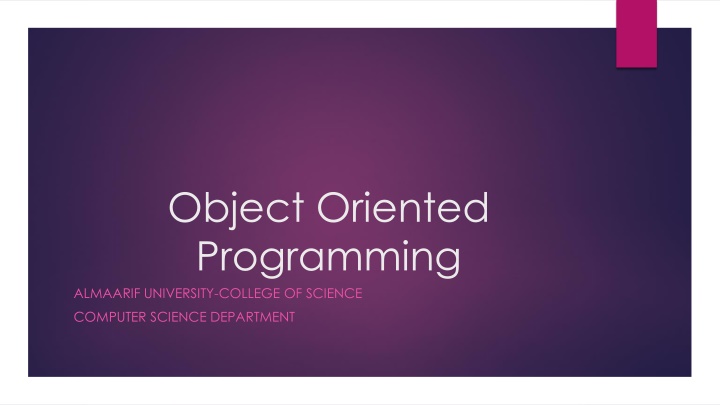
Object Oriented Programming Concepts in C++
Explore the fundamental concepts of Object Oriented Programming (OOP) in C++. Learn how OOP simplifies problem-solving by breaking them into smaller parts using classes and objects. Discover the principles of abstraction, encapsulation, inheritance, and polymorphism, essential for efficient programming. Dive into the significance of class and objects, abstraction, encapsulation, inheritance, and polymorphism in enhancing code modularity and reusability.
Download Presentation

Please find below an Image/Link to download the presentation.
The content on the website is provided AS IS for your information and personal use only. It may not be sold, licensed, or shared on other websites without obtaining consent from the author. If you encounter any issues during the download, it is possible that the publisher has removed the file from their server.
You are allowed to download the files provided on this website for personal or commercial use, subject to the condition that they are used lawfully. All files are the property of their respective owners.
The content on the website is provided AS IS for your information and personal use only. It may not be sold, licensed, or shared on other websites without obtaining consent from the author.
E N D
Presentation Transcript
Object Oriented Programming ALMAARIF UNIVERSITY-COLLEGE OF SCIENCE COMPUTER SCIENCE DEPARTMENT
OOPs Concepts in C++ Object oriented programming is a way of solving complex problems by breaking them into smaller problems using objects. Before Object Oriented Programming (commonly referred as OOP), programs were written in procedural language, they were nothing but a long list of instructions. On the other hand, the OOP is all about creating objects that can interact with each other, this makes it easier to develop programs in OOP as we can understand the relationship between them. In Object oriented programming, we write programs using classes and objects utilising features of OOPs such as abstraction, encapsulation, inheritance and polymorphism.
Class and Objects Abstraction is a process of hiding irrelevant details from user. For example, When you send an sms you just type the message, select the contact and click send, the phone shows you that the message has been sent, what actually happens in background when you click send is hidden from you as it is not relevant to you. Encapsulation is a process of combining data and function into a single unit like capsule. This is to avoid the access of private data members from outside the class. To achieve encapsulation, we make all data members of class private and create public functions; using them, we can get the values from these data members or set the value to these data members.
Inheritance is a feature using which an object of child class acquires the properties of parent class. Polymorphism Function overloading and Operator overloading are examples of polymorphism. Polymorphism is a feature using which an object behaves differently in different situation. In function overloading, we can have more than one function with same name but different numbers, type or sequence of arguments.
